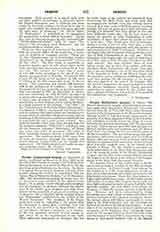

Priests’ Communion League, an association of priests established at Rome on July 20, 1906, in the Church of San Claudio, in charge of the Fathers of the Blessed Sacrament, and raised by Pius X to the dignity of an archconfraternity ten days later. Its object is to spread the practice of frequent and daily Communion among the faithful in conformity with the Decree “Sacra Tridentina Synodus” of December 20, 1905. The conditions for joining the league are: (I) To have one’s name inscribed on the register of the league; (2) to pledge oneself (though under no obligation of conscience) to promote zealously the observance of the Decree upon frequent and daily Communion by the apostolate of prayer, of preaching, and of the press; (3) to subscribe for the monthly periodical “Emmanuel“, published by the Fathers of the Blessed Sacrament. The members of the league begin their work by explaining to the people what the Eucharist is; when, how, wherefore, and with what love it was instituted by Jesus Christ; what are its effects, whether considered as a sacrifice, as the real, perpetual presence of God among us, and, above all, as the nourishment of our souls. They endeavor strenuously to dissipate the fear by which many of the faithful are prevented from frequenting the Holy Table, and teach them that to communicate lawfully every day nothing more is exacted than what even yearly Communion requires, namely, the state of grace and a right intention, although it is desirable that they should be free also from deliberate venial sins. As the best means to spread the practice of daily Communion is daily attendance at Mass, they exhort the people to hear it every day. They should give their parishioners, during a period of not less than three days, a series of instructions dealing especially with the practice of and preparation for daily Communion. Members of the league take care to prepare children for the reception of Holy Communion at an early age. Priests belonging to the league enjoy the right of a privileged altar three times a week, provided they have not that right already; they may celebrate Mass an hour before sunrise and an hour after midday, and may distribute Holy Communion till sunset; they may gain a plenary indulgence on all the first-class feasts of the mysteries of faith, of the Blessed Virgin, and the Apostles; and an indulgence of 300 days for every work they perform for the intention of the league; they may impart at the end of the triduum, after the general Communion, the papal benediction with the plenary indulgence attached. Lastly, penitents confessing to priests enrolled in the league may gain a plenary indulgence once a week, if accustomed to communicate very frequently.
A. LETELLIER

